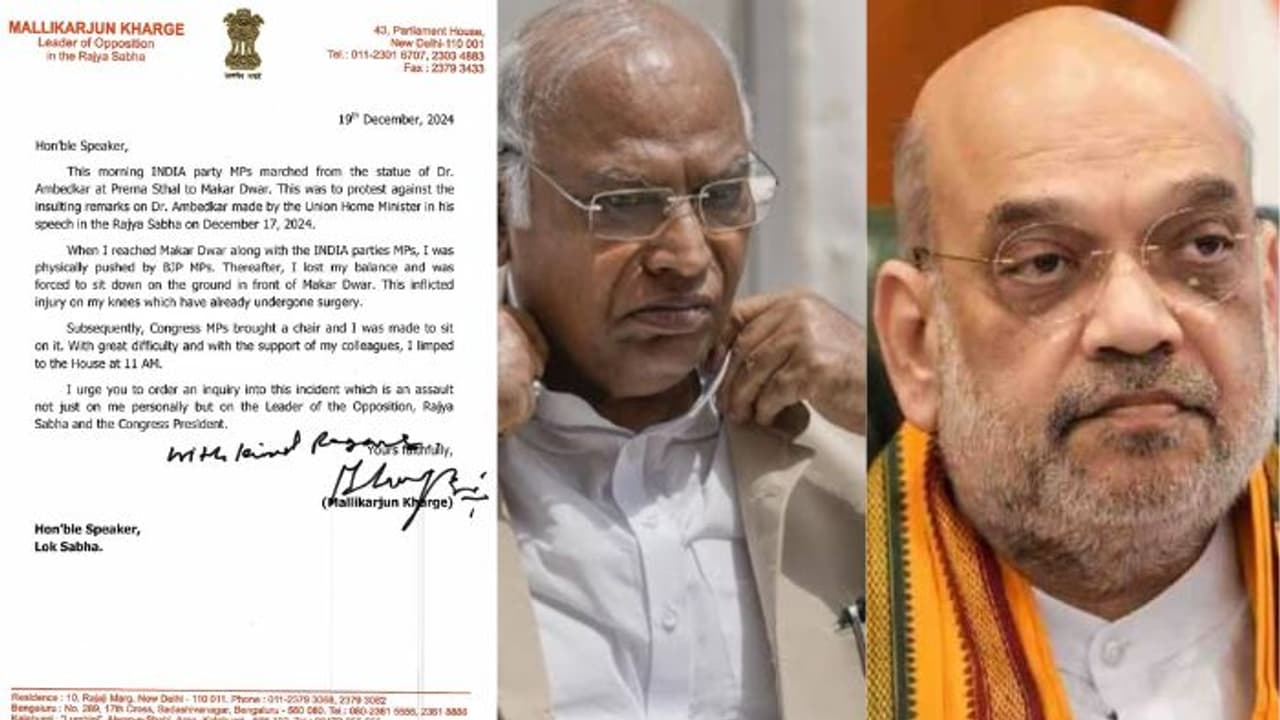Congress President Mallikarjun Kharge filed a privilege motion against Home Minister Amit Shah in the Rajya Sabha, accusing him of insulting Dr. B.R. Ambedkar with defamatory remarks. The Opposition claims Shah’s comments disrespect Ambedkar’s legacy, sparking political protests in Parliament.
New Delhi: Congress President Mallikarjun Kharge has submitted a privilege motion against Home Minister Amit Shah in the Rajya Sabha over his remarks on Dr. B.R. Ambedkar. The Congress alleged that Shah's comments were disrespectful and amounted to an insult to the chief architect of the Indian Constitution.

The privilege motion was filed under Rule 188 of the Rules of Procedure and Conduct of Business in the Council of States (Rajya Sabha). This rule allows members to report breaches of parliamentary privileges. Such motions are filed if a member feels that the dignity, rights, or powers of Parliament or its members have been undermined.
Chaos after BJP MP suffers head injury, blames Rahul Gandhi amid protests outside Parliament; He reacts| WATCH
Kharge, who is the Leader of the Opposition in the Rajya Sabha, accused the Home Minister of making "defamatory statements" and using a "satirical tone" against Ambedkar during his speech on December 17. Shah stated that Congress leaders might have secured a place in heaven if they had chanted God's name instead of frequently invoking Ambedkar's name.
Kharge stated in his notice, “Any misconduct or defamatory statements in the House constitute a breach of privilege. The Home Minister’s remarks, tone, and tenor insult Dr Ambedkar. Using his name in this manner is derogatory and in poor taste.”
What is a Privilege motion?
A privilege motion is a formal complaint raised by a Member of Parliament if they believe another member, minister, or authority has violated the privileges of the House or its members. Parliamentary privileges are special rights granted to MPs and the Houses to ensure they can function effectively. These privileges are not codified but are derived from constitutional provisions, legal conventions, and practices.
Key sources of these privileges include:
- Article 105 of the Constitution: Grants freedom of speech in Parliament and immunity from court proceedings for actions within the House.
- Parliamentary Conventions: Long-standing practices followed in legislative proceedings.
- Code of Civil Procedure, 1908: Provides additional legal protections for members.
If the presiding officer accepts a privilege motion, it can lead to an investigation or a censure against the accused member or minister. Such motions are critical to maintaining the dignity and integrity of Parliament.
'Congress spreading lies, twisted my words': Amit Shah amid massive Ambedkar row (WATCH)
This development came a day after Trinamool Congress (TMC) MP Derek O'Brien submitted a similar privilege notice, alleging that Shah demeaned Ambedkar and belittled the Opposition’s contributions. The remarks sparked uproar in Parliament, with the Opposition accusing the BJP of disrespecting Ambedkar’s legacy.
The privilege motion against Shah adds to the heated debates in Parliament. Opposition parties, including the Congress and TMC, have criticized the BJP for what they call repeated attempts to undermine Ambedkar’s contributions. On the other hand, BJP leaders have defended Shah, accusing the Opposition of distorting the remarks for political mileage.
